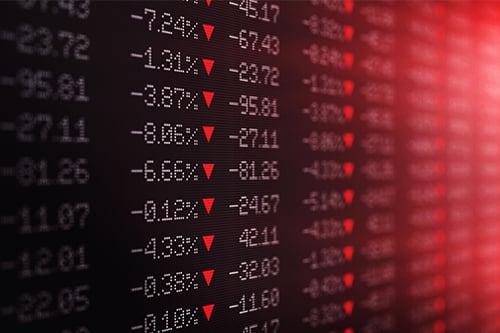

As the novel coronavirus continues to spread across the globe and governments respond with measures to hamper its progress, Swiss Re Institute has reported that the economic fallout from the pandemic will be significant.
In a report published on March 10, the research arm of the reinsurer stated that there will be a global recession this year and no “V”-shaped recovery (where the economy experiences a sharp, but brief period of economic decline followed by a strong recovery). This is a result of several factors that include the global outbreak as well as tightening financial conditions and the weak economic environment that was already in place before the pandemic hit. Swiss Re noted that at this point, the recession would be mild, but it could become deeper and more prolonged if the outbreak does not peak in April/May.
Read more: Coronavirus – all the latest news in Canada
Pressure on the supply chains linking the manufacturing hub in China with the rest of the world has already resulted in a slowdown of goods coming out of the country. Meanwhile, the demand for goods and services in Europe and the US will likely fall as a result of the virus, which will likewise put a damper on the global economy.
“The longer this lasts, the more severe this will be on the companies in other countries because they will run out of their stocks, and then will have to slow down their production and their sales,” said Thomas Holzheu, Swiss Re’s chief economist for the Americas. “The second economic effect is the collapse of the oil price and there will also be impacts on other commodities, again related to the slowdown of the Chinese economy,” since a massive slump in activity in China will in turn lower demand for energy and other materials.
Anyone watching the ticker tape at the bottom of a broadcast will have already seen the impact that the virus has had on financial markets, which is the third stream of havoc that the virus is wreaking on the global economy.
“The financial markets are trying to digest this erratic flow of information,” said Holzheu, “so we have a lot of uncertainty here and a lot of volatility. Stocks are down, credit spreads are widening, and financial conditions are tightening very quickly,” even as interest rates are being cut to very low levels.
Notably, this is all taking place as many countries finally enact severe measures to slow the spread of the virus. For example, a major economy that is still seeing the impacts of the virus take shape is the United States, where events are being cancelled, public venues are being closed, people are being sent home to work, and schools are closing.
The coronavirus has come at a less-than-ideal time since the global economy was less resilient going into 2020 than it had been before the financial crisis in 2008/2009. The key factor has been economic policy and the inability of institutions – both central banks and individual governments – to react to an adverse event.
“There’s not a lot of room for further monetary stimulus. We already have negative interest rates,” said Holzheu, pointing to the US where the Federal Reserve has cut interest rates to near-zero. “The ammunition has been used up and now it’s up to more quantitative easing, but [there’s] much less room than there was available and much less ability to create stimulus with low interest rates when compared to 2006 or 2007.”
On the fiscal side, governments’ ability to put spending packages in place is limited in some countries in Europe as well as Japan where debt levels are very high and political capital is weaker than what we saw 15 years ago, continued Holzheu. “In that respect, the ability to react in a coordinated way – where fiscal and monetary policies are coordinated within a country, but then also across the larger economies – is lower than before the last crisis.”
In this environment, global insurers are now being threatened with coronavirus from two directions – a sharp increase in payouts and, at the same time, significant investment losses. However, the news isn’t all bad. An economic slowdown could impact demand for insurance, but not significantly since demand for property, auto and many other lines of insurance is not as closely tied to economic activity as it is to capital stock and physical goods. Demand for coverage for exports, and engineering and construction projects could, on the other hand, see a drop-off. Finally, the effect of the coronavirus on claims is still ‘to be determined.’
“There might be some impact on motor from less driving and the accident frequency might go down,” said Holzheu, adding, “A lot of the business interruption insurance is tied to physical events and not to pandemics so even though we see a lot of supply chain disruption, most of these policies would not react.”
However, at least 50% of insurers’ $20 trillion in assets under management is invested in government bonds whose values are falling, according to analysts. In turn, insurers need to put aside more capital for future payouts to policyholders, which puts a dent in their solvency levels.
Holzheu said, “If [the pandemic] is more protracted and severe, then there will be credit events and some defaults in insurers’ bond portfolios, so there will be disruptions on the asset side from these market movements.”
